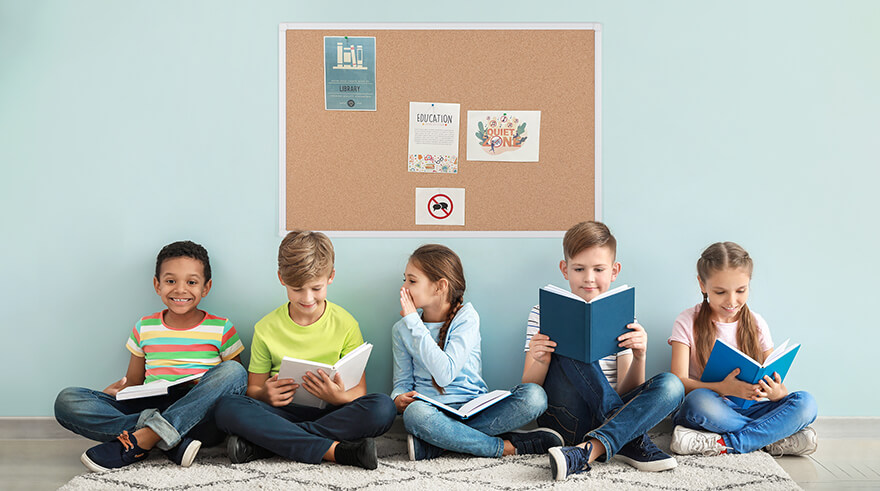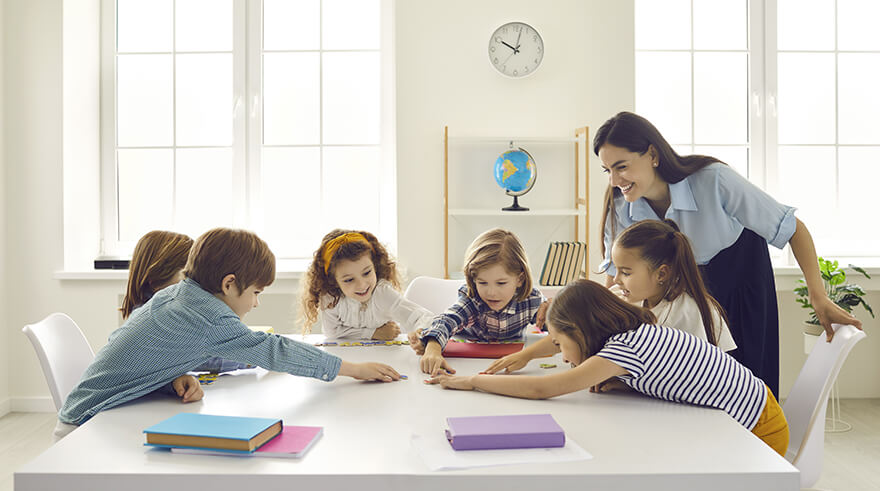Whether starting school for the first time or returning from holiday break, students and the school community are more exposed to germs at school than they are at home. Children are often in close proximity, have poor hygiene routines, and spend large periods of time in the classroom. It's the perfect setting for microbes like bacteria to spread easily and quickly between pupils. This often leads to the transmission of contagious diseases, skipping classes, and interrupted learning.
Bi-Office's product range includes Antimicrobial learning tools that are designed to meet classrooms’ new needs. These products complement the existing cleaning practices and increase hygiene levels in a school environment. Having Antimicrobial products in school facilities reduces the absenteeism caused by transmitted diseases among students.
Antimicrobial classroom Vs. Standard classroom
Bi-Office Antimicrobial products integrate BioCote® technology and can be a part of any project of a clean and safe environment. In 2014, we created the world's first antimicrobial classroom at a UK primary school, along with our BioCote® partners. We aimed to provide and assure a cleaner, more hygienic learning environment.
The study investigated the levels of bacteria recovered from the antimicrobial classroom and compared them against a standard classroom. Bacterial levels were monitored in both classrooms over the period of an academic year. The two classrooms were chosen due to their similarities in use, location, and demographics:
- One was completely refurbished with BioCote® Antimicrobial protected products – from light switches and door handles to tables and chairs.
- The other classroom served as the control environment, using only standard yet comparable products.

The outcome was astonishing! We recorded a 96% bacteria reduction in the antimicrobial classroom. As a result, the number of children missing school over the course of the academic year due to diseases transmitted in the classroom also decreased by 20%. In essence, every Antimicrobial product harboured significantly fewer bacteria than their standard counterparts.
3 tips to stay healthy
As effective as they are, there's only so much Antimicrobial products can do to protect the health of children and the school personnel. Everyone needs to keep clean and maintain healthy habits to avoid getting sick. So, here are 3 essential tips to improve personal hygiene and stay healthy:
1. Keep hands clean
The single most effective way to help prevent the spread of infections is thorough hand washing. Always wash hands with water and soap in situations like:
- After using the toilet
- Before eating
- After playing outside
- After touching something dirty
- After coughing, sneezing, or blowing the nose
- After touching a dirty tissue
- After petting/stroking animals
- Whenever hands look dirty
- Keep a pack of Hand Sanitiser in your bag or lunch bag so you remember to use it before eating
2. Coughs and sneezes spread diseases
Cover nose and mouth with a tissue when coughing or sneezing to stop germs from being airborne. Throw used tissues in a bin and always wash hands with soap and water afterward. If there isn’t a tissue available, sneeze or cough into the crook of the elbow instead of the hands, to reduce the spread of bacteria.
3. Healthy diet
A varied and balanced diet will help the immune system and increase the protection against diseases, promoting proper growth and development. Eating correctly also helps concentration during lessons.

School has taken on new meaning and a new set of worries for parents and other caregivers during this COVID-19 era. Schools must now balance the educational, social, and emotional needs of their pupils along with the health and safety of students and staff amid the evolving pandemic.


.png)